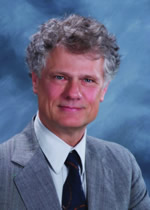Professor to Assess ‘No Child Left Behind’ Supplements
Do after-school tutoring sessions – required of public schools failing to meet No Child Left Behind goals – work? That is the question UALR psychology Professor Robert Corwyn hopes to answer during his summer research project.
 Corwyn, assistant professor in UALR’s College of Arts, Humanities, and Social Sciences, is the principal investigator of supplemental educational services for the Arkansas Department of Education. He will be researching the efficacy of after-school tutoring as required of public schools that fail to meet yearly educational progress goals for three years in a row.
Corwyn, assistant professor in UALR’s College of Arts, Humanities, and Social Sciences, is the principal investigator of supplemental educational services for the Arkansas Department of Education. He will be researching the efficacy of after-school tutoring as required of public schools that fail to meet yearly educational progress goals for three years in a row.
The No Child Left Behind law requires tutoring and other supplemental education services to be conducted by third-party contractors.
“Some of the contractors provide services all over the country. They often have large staffs and are required to offer research-based tutoring that supplements the instruction students receive in the classroom,” Corwyn said. “One of my jobs is to identify the characteristics of programs that have a positive impact on student academic achievement.”
Corwyn, who recently received a Faculty Excellence Award for Research from the UALR College of Arts, Humanities, and Social Sciences, is expected to present an impact study with tentative findings later this summer.
The professor, who has been conducting this research for three years, said his early findings have been positive.
“Most parents are very happy with the providers,” he said. “They say their kids have improved in their schoolwork. Although some problems have been reported, most school districts have been satisfied with SES providers in the past.”
Despite the satisfaction of schools and parents, there have been problems when providers cannot meet the stipulations for services as required by the NCLB law.
“Districts typically do not sign good contracts with providers,” Corwyn said. “One example of a problem with providers is that they cannot make a profit tutoring in rural schools which typically do not have many students requiring their services. One solution to this issue is usually to tutor by Internet, but the school may not have access to the Internet.”
Arkansas is not alone in trying to meet the stipulations of NCLB’s supplemental educational services.
“Only a handful of states in the nation are ahead of the curve,” Corwyn said. “But the Arkansas Department of Education, although understaffed, is doing a great job of collecting data pertinent to the research I am doing. In fact, Arkansas could be among the first 10 states to put into place a data collection system specifically designed for the evaluation of supplemental educational services.”
President George W. Bush signed NCLB in to law in 2001. A bipartisan effort in Congress, the act expanded on standards-based education initiatives and accountability measures for educators. The act provided additional federal funding for school resources which placed emphasis on reading, writing, math, and science. NCLB requires that students are classified as deficient, proficient, or advanced in a variety of subjects and aims to have all U.S. students proficient by 2014.
NCLB is currently up for reauthorization by President Barack Obama. His administration is reassessing NCLB and proposing changes to the law, such as rewarding educators for exemplary student performance instead of punishing for poor performance, offering competitive grants to schools, and assessing a student’s education through readiness for college and careers as opposed to annual yearly progress. The latter revision would strike the 2014 proficient goal as set by the previous administration.